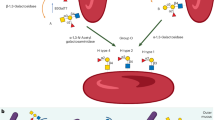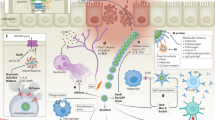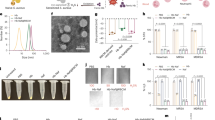Abstract
UREA has been used by various authors1–3 for the extraction of bacteria. The work of Neter et al.4 encouraged me to study urea-treated Gram-negative bacteria (S. typhi, S. paratyphi B, S. cholerae suis and Shigella sonnei) in the indirect hæmagglutination reaction (for further details see Brodhage5).
This is a preview of subscription content, access via your institution
Access options
Subscribe to this journal
Receive 51 print issues and online access
$199.00 per year
only $3.90 per issue
Buy this article
- Purchase on Springer Link
- Instant access to full article PDF
Prices may be subject to local taxes which are calculated during checkout
Similar content being viewed by others
References
Walker, J., Biochem. J., 34, 325 (1940).
Hand, C. N., Lancet, i, 277 (1953).
Toda, Y., Ann. Tuberc. (Tenri), 7, 1 (1956).
Neter, E., Westphal, O., Luederitz, O., and Gorzynski, E. A., Ann. N.Y. Acad. Sci., 66 141 (1956). Neter, E., Gorzynski, E. A., Gino, R. M., Westphal, O., and Luederitz, O., Canad. J. Microbiol., 2, 232 (1956).
Brodhage, H., Z. Hyg., 148, 94 (1961).
Weinbach, R.., Schweiz. Z. Path. Bact., 21, 1043 (1959).
Gillissen, G., Z. Hyg., 148, 105 (1961).
Author information
Authors and Affiliations
Rights and permissions
About this article
Cite this article
BRODHAGE, H. Urea-treated Gram-negative Bacilli in the Indirect Hæmagglutination Reaction. Nature 193, 501–502 (1962). https://doi.org/10.1038/193501a0
Issue Date:
DOI: https://doi.org/10.1038/193501a0
Comments
By submitting a comment you agree to abide by our Terms and Community Guidelines. If you find something abusive or that does not comply with our terms or guidelines please flag it as inappropriate.



